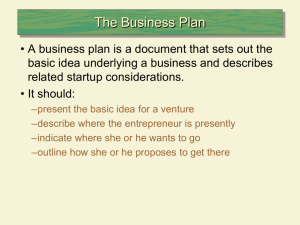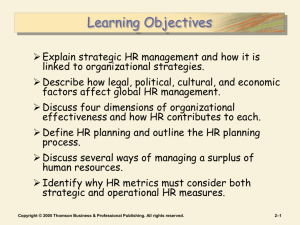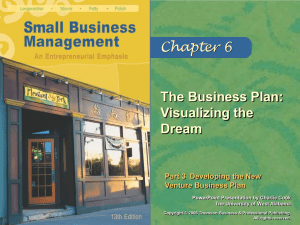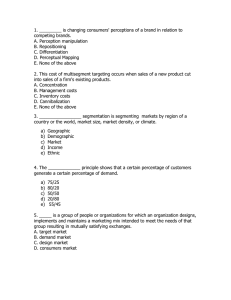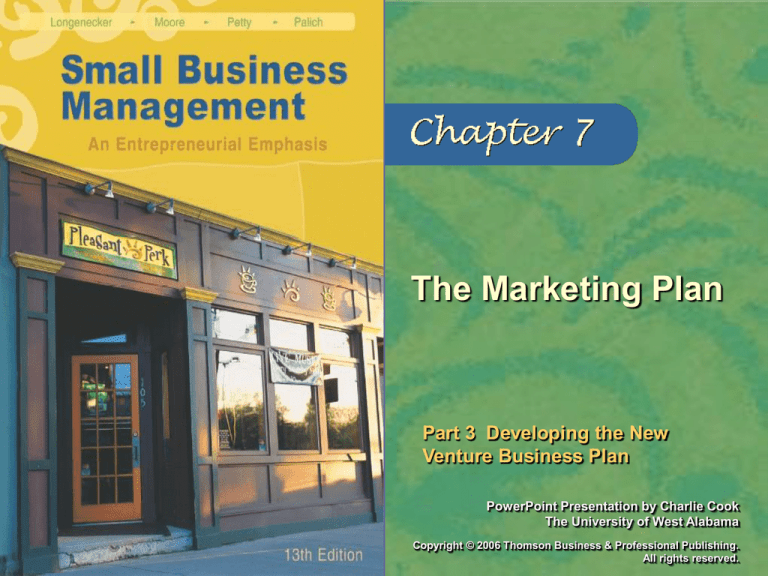
The Marketing Plan
Part 3 Developing the New
Venture Business Plan
PowerPoint Presentation by Charlie Cook
The University of West Alabama
Copyright © 2006 Thomson Business & Professional Publishing.
All rights reserved.
Looking Ahead
After studying this chapter, you should be able to:
1.
Describe small business marketing.
2.
Identify the components of a formal marketing plan.
3.
Discuss the nature of the marketing research process.
4.
Define market segmentation and its related strategies.
5.
Explain the different methods of forecasting sales.
Copyright © 2006 Thomson Business & Professional Publishing. All rights reserved.
Student 7–2
Marketing Philosophies
• Three distinct marketing philosophies are the
production-, sales-, and consumer-oriented
philosophies.
• A small business should adopt a consumer
orientation to marketing, as that philosophy is
most consistent with long-term success.
• Small business marketing consists of numerous
activities, including market analysis and
determining the marketing mix.
Copyright © 2006 Thomson Business & Professional Publishing. All rights reserved.
Student 7–3
The Marketing Plan
• The marketing plan should include sections on
market analysis, the competition, and marketing
strategy.
• The market analysis should include a customer
profile.
• Four areas of marketing strategy that should be
discussed in the marketing plan are decisions
affecting the total product and/or service,
distribution decisions, pricing decisions, and
promotional decisions.
Copyright © 2006 Thomson Business & Professional Publishing. All rights reserved.
Student 7–4
Marketing Research
• Marketing research involves the gathering,
processing, reporting, and interpreting of
marketing information.
• The cost of marketing research should be
evaluated against its benefits.
• The steps in marketing research are:
–identifying the informational need
–searching for secondary data
–collecting primary data
–interpreting the data gathered
Copyright © 2006 Thomson Business & Professional Publishing. All rights reserved.
Student 7–5
Market Segmentation
• A focus strategy relies on market segmentation,
which is the process of dividing the total market
for a product or service into groups, each of
which is likely to respond favorably to a specific
marketing strategy.
• Three types of market segmentation strategies
are (1) the unsegmented approach, (2) the
multisegment approach, and (3) the singlesegment approach.
Copyright © 2006 Thomson Business & Professional Publishing. All rights reserved.
Student 7–6
Market Segmentation (cont’d.)
• The unsegmented strategy—when a business
defines the total market as its target—is also
known as mass marketing.
• A firm that determines that two or more market
segments have the potential to be profitable and
then develops a unique marketing mix for each
segment is following a multisegment strategy.
• A firm that follows a single-segment strategy
recognizes that several distinct market
segments exist but chooses to concentrate on
reaching only one segment.
Copyright © 2006 Thomson Business & Professional Publishing. All rights reserved.
Student 7–7
Sales Forecasting
• A sales forecast is an estimation of how much of
a product or service will be purchased within a
market during a defined time period.
• The forecasting process may be either a
breakdown or a buildup process and may be
either direct or indirect, depending on the
predicting variable.
Copyright © 2006 Thomson Business & Professional Publishing. All rights reserved.
Student 7–8
Key Terms
small business marketing
market analysis
marketing mix
customer profile
marketing research
secondary data
primary data
market
market segmentation
segmentation variables
benefit variables
demographic variables
unsegmented strategy
(mass marketing)
multisegment strategy
single-segment strategy
sales forecast
breakdown process
(chain-ratio method)
buildup process
direct forecasting
indirect forecasting
Copyright © 2006 Thomson Business & Professional Publishing. All rights reserved.
Student 7–9


